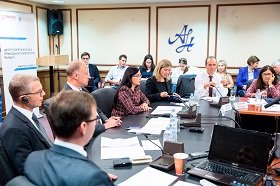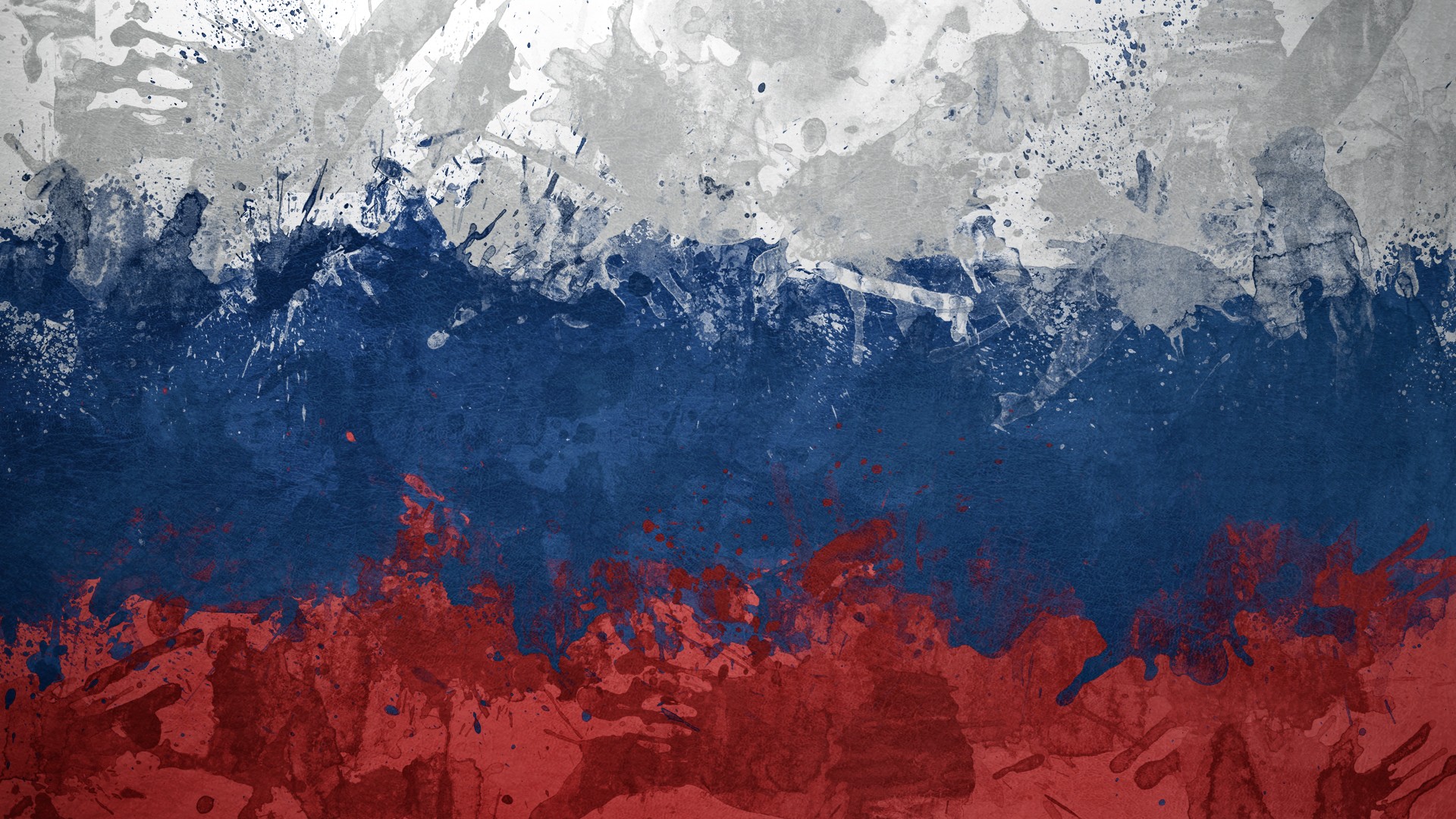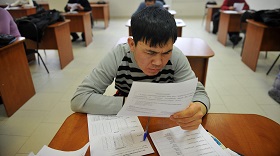What should a state
prioritize in matters of migration policy: ethics and morals or pragmatic
considerations? Who is more effective at protecting migrant rights: government
bodies or non-governmental human rights organizations? Will a global agreement
on migration be signed? RIAC Editing Team discusses these issues with leading
experts on foreign migration from Russia and abroad: Professor Irina Ivakhnyuk,
Member of the Global Migration Policy Associates (GMPA), and Vladimir Malakhov,
Director of the Centre for Political Theory and Applied Political Sciences at
the Russian Presidential Academy of National Economy and Public Administration
(RANEPA),
David Owen, Professor of Social and Political Philosophy,
University of Southampton (UK), Ben Hayes, Research Fellow, Transnational
Institute (Netherlands), Violeta
Vagner, Senior Project Manager, International Center for Migration
Policy Development (ICMPD,
Vienna), Tiziana Bonzon,
Migration and Displacement Global Lead, International Federation of Red Cross
and Red Crescent Societies (IFRC, Geneva), on the sidelines of
the IV International Conference “Migration and International Law.”
What should a state prioritize in matters of migration policy: ethics and morals or pragmatic considerations? Who is more effective at protecting migrant rights: government bodies or non-governmental human rights organizations? Will a global agreement on migration be signed? RIAC Editing Team discusses these issues with leading experts on foreign migration from Russia and abroad: Professor Irina Ivakhnyuk, Member of the Global Migration Policy Associates (GMPA), and Vladimir Malakhov, Director of the Centre for Political Theory and Applied Political Sciences at the Russian Presidential Academy of National Economy and Public Administration (RANEPA), David Owen, Professor of Social and Political Philosophy, University of Southampton (UK), Ben Hayes, Research Fellow, Transnational Institute (Netherlands), Violeta Vagner, Senior Project Manager, International Center for Migration Policy Development (ICMPD, Vienna), Tiziana Bonzon, Migration and Displacement Global Lead, International Federation of Red Cross and Red Crescent Societies (IFRC, Geneva), on the sidelines of the IV International Conference “Migration and International Law.”
What considerations should primarily guide a state’s migration policy: moral and ethical imperatives or pragmatism?
Irina Ivakhnyuk: Any migration policy may incorporate three sometimes contradictory objectives: economic pragmatism, national security and human rights. Russia has prioritized different objectives in different historical periods.
In the 1990s, the focus was placed on human rights. That was a period of humanitarian migration, when people were returning from the former Soviet republics. They had to be provided with a favourable living environment. Human rights were, indeed, a number one priority.
In the mid-2000s, economic pragmatism was put to the fore. The Russian economy was on the rise and workers were needed. Migration legislation was reformed, and the Russian labour market was essentially opened up for migrants from the CIS with a visa-free entry regime.
Today, national security considerations are the priority. Such a period involves tightening migration legislation and shutting down illegal migration channels. As a rule, this entails a rise in illegal migration, since, if people are determined to leave their countries and come to Russia (migration is an inertial process), then they will find a way to do so, either legally or illegally. Their arrival as illegal migrants is certainly worse: they will not be protected and will search for various ways to earn money (these ways will not always be legal), and that is, of course, much worse.
Ideally, the three objectives should be balanced. But I would not say that there is a single country that has succeeded in balancing these objectives. They are indeed in a permanent state of flux.
Of course, migration policy should be situational (gauged by economic development, social situation, etc.), yet a certain strategic course should be present. If fluctuations in migration policy depend on the strategic line, then this is a normal development of migration policy.
When, a couple years ago, we submitted a proposal on the strategy for the development of Russia’s state migration policy up to 2035, we based it on just such an approach. That is, it should be founded on specific concepts of what Russia expects from migration: mitigating its demographic problems, labour market issues, etc. National security considerations and ensuring human rights should be aligned with these concepts too.
Vladimir Malakhov: I would say that the raison d’état (national interests) of any state means that pragmatism should be the top priority, there can be no other opinion. But pragmatism and other considerations are not entirely incompatible, since moral and ethical considerations can be built into the pragmatic considerations.
Let us take the migration crisis in Germany as an example. Having taken in refugees, the Germans seemed to have been acting in accordance with some moral imperatives: people need help, etc. However, there was also a rational pragmatic idea: solving the demographic problem. Germany has a big problem with its workforce: the working population is not reproducing. This is a disaster. At the same time, 72 per cent of new arrivals are people under 30.
If a state does not meet certain minimal moral requirements, for instance, in the same refugee question, then it suffers a certain damage to its reputation. Again, it is a blow to the state from the point of view of pragmatics: if we want to be respected in the global community, we need to behave in accordance with certain norms. Therefore, I would not draw a sharp line between morality and pragmatic considerations.
David Owen: The distinction between the moral and the pragmatic is clearer in practice. There has to be a set of basic law and moral constraints on migration policy. You cannot, for example, engage in people smuggling or human trafficking as part of the migration policies. There has to be a set of basic human rights constraints on any state migration policy. At the same time, however, there are pragmatic considerations. A key question concerns the future effects of the pragmatic considerations. To what extent does the pragmatic migration policy build the basis for future development of the migration policies? Take an example. The migration policies of Western states after the WWII were essentially driven on pragmatic grounds. Those policies ended up providing the basis for elements of multiculturalism and for funding the Union policies, as well as developing kind of basis for more structured relations particularly with the past colonies. In deciding between different pragmatic policies there must be the same stake, and ideas to what those policies might possibly lead in the future.
Violeta Vagner: I think that the migration policy of the state is a complex instrument, so there are much more things which should be included there. Of course, strategic approach and the geopolitical situation of the country, the interests of the country, first of all, and the interests of the people should be absolutely analyzed and included.
Moral principles is another thing but I think we should also not forget about legal issues which can under certain circumstances become closer to moral and ethical complications. The interests of the state and its strategic approach should at the same time be balanced against the international obligations of this country. Much more things should be included when you craft the admission strategy of the country.
Tiziana Bonzon: We are humanitarian organizations and we are driven by principles. So, I would say that principles and values are extremely important features. And it should be really a primary approach. Clearly, we have to be more concrete and look at the specific needs and vulnerabilities in different contexts. A pragmatic approach is always needed but principles in these issues should always be guiding. It's always a combination, I would say. But if we start ignoring principles and values, then the consequences will be much more serious.
What institutions are particularly effective at protecting migrant rights: governmental or non-governmental?
Irina Ivakhnyuk: This is a very complicated question. What do we mean by effectiveness? How do we measure it? If we ask what institution can provide migrants with greater protection, then it is primarily the state. It is the state that sets the rules of the game. For instance, it handles the problem of complying with the principle of equal pay for equal work for migrants and natives. Obviously, the key right of migrants – something that needs to be respected and which gives migrants the opportunity to integrate into society or adapt – is the right to work. What institution can ensure their right to work? Of course, the state.
But I cannot ignore NGOs that work directly with migrants and therefore understand their needs much better. It is important that non-profit organizations provide them with legal and other information assistance.
The ideal variant would be a private-public partnership uniting NGOs, businesses and the state.
Vladimir Malakhov: Again, I think that choosing between two options is not quite right, because the state and non-profits specialize in different things. Even though state agencies and humanitarian human rights organizations have different objectives, it does not mean cooperation is impossible.
Non-profits or NGOs have a great advantage: they do not have a lot of red tape. This makes them very efficient. But they do not have any money. The state has money, but red tape is overwhelming.
A non-profit organization may present a programme, and if the state likes it, it will say, “Do the work.” That way, red tape is reduced to a minimum.
David Owen: The courts. In terms of getting migrant protection on the political agenda, the NGOs are crucial: they are very important in terms of publicizing problems. In terms of actually protecting rights it’s actually the courts, both national and European, depending on the kind of case, either the European Court of Justice, or the European Court of Human Rights. Governments need to be there to account, and NGOs do that in one direction, but courts do that in a different direction. There is a set of EU institutions under commission, for example, our Parliament has made good proposals for migrants and particularly for third-country nationals. But there is potential for cooperation between the European Union and national governments. There needs to be more humanization.
Ben Hayes: I think it is important to talk about the risks the humanitarian organizations face, it’s crucial to protect the data. Firstly, we talk about personal data of vulnerable people. They’re not vulnerable because they are migrants, they’re vulnerable because of their position vis-a-vis the law. States are using increasingly sophisticated means of data collection, data analysis, surveillance to, basically, determine who is or isn’t entitled to remain in the country. That’s a real risk for humanitarian organizations because the data of their clients, if not properly protected, could be used not in the best interests of those individuals. The second reason, as we know from the revelations with Edward Snowden, is that states have been actively targeting humanitarian organizations to gain advantage in a particular conflict. So, not only do we have standard data protection challenges that all organizations face, we also face considerable information security risks brought about partly by the vulnerability of the technology we use, and partly by states.
Violeta Vagner: In my dream world, of course, state institutions should be responsible for protection of the human rights – not only the migrants’ rights, because migrants are humans, first of all. And for me, the meaning of ‘migrant’ is temporary because a migrant is a person who has just crossed the border, and then, from this point on, he [or she] is either temporary sited in this country or permanently.
Otherwise, a person can be a migrant an entire life, and it can be illustrated by my own personal example. Now I live in a foreign country in which I pay taxes of all kinds. And I don’t want to agree that I have migrant human rights, because they are my human rights as there is a state where I live, where my children live, where I pay taxes, where my family is. Again, in my dream world the state is responsible for the human rights.
Tiziana Bonzon: I would say that there are different roles and responsibilities. It's difficult for me to say which of them are more efficient or less efficient. It's not up to us to judge. But I believe that they can complement each other. For instance, National Red Cross and Red Crescent Societies can fill the gap in some places, where this is appropriate. So, it really depends on the place. The Red Cross and Red Crescent Societies are auxiliary to the governments’ work in the field. This is the way for the International Red Cross and Red Crescent Societies to have this level of co-operation when it comes to humanitarian issues.
How would you assess the prospects of a global migration agreement?
Irina Ivakhnyuk: I am sceptical. I believe that a lot of effort has been put into developing the document, and I think that, for the time being, the process will be confined to the negotiation platforms. I highly doubt that it will be somehow implemented in national legislations. Most likely, the International Organization for Migration will be given a directive to implement the global agreement. However, this organization has its own approach to what it sees as the priority goal. It mostly says that, economically speaking, today’s migrant flows are rational. They are beneficial both for both the donor and destination countries.
Thus, the International Organization for Migration pays great attention to economic pragmatism. Apparently, it will re-orient itself slightly, as the global pact prioritizes human rights. I think the matter will end in major discussions, global conferences to examine global migration management and proper talks about what should be done. And still, every country will be guided by its own national interests, its national priorities, security, economic pragmatism, and so on.
I believe that global governance in this area is not possible, but it is quite viable as an excuse for discussion. Such a instrument is only possible in the long term. This process is now gradually taking place. Donor countries have already joined it; they find participation in global migration interesting and profitable, and they take part in developing all kinds of international instruments. This is very good, because a balance of interests is crucial, and the interests are objectively contradictory. A global agreement will offer another opportunity to talk and find some kind of common ground.
Vladimir Malakhov: I think the agreement will certainly be adopted. But it will most likely be a declaration. However, even if it is not binding, this does not mean that it is not necessary. I think it will be the same as with the Universal Declaration of Human Rights or the numerous conventions on protecting minorities and other instruments.
We should not think that a declaration does not impose any obligations. Yes, it is not legally binding, but it is morally binding. Upon signing it, states will commit to certain obligations. Non-compliance will mean a blow to their image, and so on. So, if such an instrument does appear, it will be a good thing for the global community.
David Owen: To be honest, I think it would be easy to achieve a global agreement on migration, as long as it has no content. I think there are two issues here. One is about the content of the agreement; the second issue is about compliance with it. We already have an international refugee regime, but compliance with that regime is relatively varied, shall we say. The big question for new declaration and its outputs is to what extent is it going to be more than a paper. It doesn’t mean paper exercises aren’t important – they are, but it’s still going to be an issue. In terms of the agreement, migration is such a huge topic: there are so many different interests about migration across different parts of the world. I think, it’s going to be a fairly limited agreement, and mainly built on existing conventions on migrant rights, providing examples of best practices. There is going to be a lot of encouragement of states to comply with and perform these practices. I think, a lot of practices will get more regional, it will push the states to provide more support for development. That is actually in the interest of states. We need to develop migration strategies that actually support states in their development processes.
Violeta Vagner: At the moment there is no global or comprehensive convention on migration. I’m a little bit skeptical of the future of such documents.
Now we all see what happens in general with the migration law. Migration law is not put forward by a parliament that makes a decision, it is the states that always have their own institutions, internal situations, and own approaches which come together, and try to adjust the existing system to their interests.
And as we could see recently, it is really very difficult to adjust countries’ interests because there are really different leaders in the world which see the world order differently. So, I would rather say that we should keep the situation as it is now rather than change it radically.
Tiziana Bonzon: There are already these two agreements. Then we can discuss the global compact on migration and the global compact on refugees. This is already a demonstration that states are willing to come to some kind of global agreements. It’s the beginning. So, I hope that this will continue because it is important for the states to come together and discuss these very complex processes of migration and displacement, and share their different perceptions, different realities, and different perspectives in a concerted way. Then the issues of capacities which will influence the ability to implement, comply, and follow will arise.
Interviewed by Anastasia Tolstukhina and Maria Smekalova.












